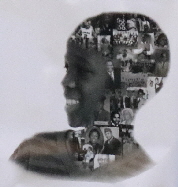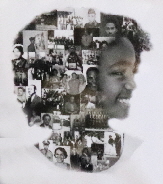FANNY COLE
A Most Enterprising Woman
In a society as extremely racist and sexist as 1840s Kentucky, it was virtually impossible for a black woman to accumulate meaningful financial assets, even if she was among the small minority who were no longer enslaved. Noting that Fanny Cole, possibly alone amongst the thousands of African-American women who lived in antebellum Clark County, accomplished this feat should provide no relief from a condemnation of racism. It does help to demonstrate that, in every generation of African-Americans in every locale in which they lived, there have always been women who had extraordinary skills, and who still deserve remembrance today for their talents. In the context of that time and place, for a black women to be able to leave substantial financial bequests to her heirs at her passing was almost inconceivable. That Fanny Cole did so is a testament to her exceptional business talents, matching resourcefulness and skill with a nearly unlimited willingness to work, leavened with a significant element of good fortune.
Only a small amount is known about Fanny’s early life. She was born circa the early 1770s, almost certainly in Virginia. She had mixed race parentage or ancestry. She was owned by John Battaille as a slave no later than the 1820s and probably long before, albeit he was younger than her. John Willis Battaille was born about 1785 in Caroline County, Virginia and may well have inherited Fanny from his father Hay Battaille, who owned a large number of slaves. John, who was still living in Caroline County in 1820, owned two women over 45 years of age at the time, one of whom was presumably Fanny. He moved to Fayette County, Kentucky in the 1820s and to Clark County in late 1827.1
Some time after moving to Kentucky, Fanny, then in her fifties, met and married Aaron Cole, a freeman who was probably in his sixties.2 Although they had well matched personalities, it was crucially fortunate for both of them that Aaron was already free.3 Despite their marriage having no legal standing in that era, and with no right for Fanny to live with her husband while she was still enslaved, they clearly had a very tight bond. Aaron’s hard work and perseverance enabled a life-changing event: he was able to save enough money to buy her. On May 29, 1827, Aaron purchased Fanny from John Battaille for $200. (This was considerably more than the usual price for a woman in her fifties.) After buying her, Aaron freed her—Fanny was the free woman in his household in the 1830 Clark County census.
The diligent Aaron also bought a house and lot—itself a major accomplishment for a black person in antebellum Kentucky—in the center of Winchester for $120 from Samuel Hanson.4 It was located on the northeast corner of what is now Broadway and Maple, called Main Cross and Water streets at the time. This location became a popular food and sundries store operated by the couple and, after Aaron’s death in the early 1830s, by Fanny.
[I remember a man who walked to town from the Paris Pike and] always dealt with old Fannie Cole, a free negro who kept a little grocery on the corner of Maple and Broadway…It was his habit to bring with him on his journeys to town a small sized tub, which he carried upon his head. When he reached town he would purchase such articles as sugar, coffee, molasses and dried herrings, deposit these in his tub, which he then put upon his head and would then return home.
-- Judge James Flanagan5
The store was sufficiently successful that, in 1835, the widowed Fanny was able to purchase an adjoining property, the site of a blacksmith shop, for $154.50 at public auction. She also purchased another small adjoining lot, fronting on Water Street, in 1836 for $50 from David White.6 Fanny’s business success was not due solely to her selling skills as a merchant with a good location for her store. She also made some of her own products.
Aunt Fanny Cole’s beer and African kitchen ginger cake (sold) two for 5 cents apiece
--Isaac N. Massie
After Aaron’s death, Fanny recruited a young nephew, Jerry Johnson, who was born about 1823, to help her with the store. Fanny must have purchased Jerry’s freedom, because he was undoubtedly the free young man who was living with her in the 1840 census. He appeared in the 1850 Clark County census, together with his wife and son, all of them free, under the name Jerry Cole.
Fanny Cole died in October 1849. Her will and estate inventory provide a fascinating window on just how much she had managed to accomplish as a businesswoman in the last two decades of her life
(multiply each dollar figure by as much as 100 for a current estimate of its value). 7
1 John Willis Battaille also owned a woman named Aggy (Battaille), who joined the Providence Baptist Church inDecember 1827 following the relocation of his household to Clark County. Aggy was obviously known to Fanny, they may have been related. It’s likely that Aggy was closely related to some of Fanny’s heirs, for example, she was probably the mother of William Battle (or Battaille), and she may have been the mother of others of Fanny’s heirs.
2 There’s no way of knowing for certain that Aaron Cole had not married Fanny in Virginia but it would have been a most unusual and difficult process for a free man to follow his enslaved wife to a different state. Nor did Fanny and Aaronhave any children with them in 1830.
3 It remains unknown how Aaron Cole obtained his emancipation and how long he had been free. No African-Americannamed Aaron Cole was named in the 1820 U.S. census. However, even if he was already free in 1820, he would not have been named in the census unless he was head of a household. The known white Cole households in Clark County in that era provide little clue. Those were the Jesse Cole and Ann Cole households. Jesse Cole was a white man in Winchester, born about 1784 (and died in 1834), who had lived in Clark County since at least 1810 with his wife and children. Jesse Cole did not own any slaves in 1830. In the 1820 Clark County census, Jesse Cole owned two slaves but they were both recorded as boys under 14. Ann Cole (unknown if she was related to Jesse Cole) died about 1820 in Clark County and wasn’t included in the 1820 Clark County census. She owned slaves at the time of her death but they did not include Aaron. Aaron Cole may have instead lived in Fayette or another adjacent county, however, there were no households headed by a person with the Cole surname in the 1820 census for the surrounding counties which included either free African-Americans or adult male slaves.
4 The date of Aaron’s purchase of this home is unknown since, oddly, there appears to have been no deed recorded for it at the time. Presumably it was in the 1820s. Samuel Hanson confirmed the purchase of the house and lot by a deed to Fanny on July 28, 1842 (Clark County deeds vol. 30, p. 435), in which he stated that Aaron Cole had paid him $120 for the property and that Aaron had left it to Fanny in his will. There is no probate record for Aaron and his will therefore was apparently unrecorded.
5 Thank you to Harry Enoch, who provided me with these quotes about Fanny Cole, which he used in a newspaper column in the Winchester Sun. He also forwarded copies of Fanny’s deeds.
6 The 1835 and 1836 deeds were recorded in Clark County volume 27, pages 360 and 445.
7 Fanny’s will was dated October 3, 1849 and proved in October 1849 (vol. 12, p. 94). Her estate inventory was dated October 25, 1844 (vol. 12, p. 144).
WINCHESTER BLACK HISTORY
AND HERITAGE COMMITTEE


© 2019-2024, ALL RIGHTS RESERVED,
Winchester Black History and Heritage Committee
Website Designed and managed by Graphic Enterprises

